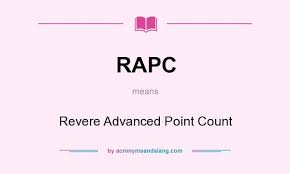
The Revere Advanced Point Count (RAPC) system is one of the most complex counting systems ever developed. It is another brainchild of Lawrence Revere, along with his co-developer, Julian Braun.
It is an advanced level four system, meaning it has a large index range (-4, -3, -2, -1, 0, +1 +2, +3, +4) to keep track of cards. You can see that means there are 9 possible values to account for, however, another tricky point with this system is that +1 and -2 are not assigned to any cards.

Revere developed this between 1971 and 1974, however, probably because of it’s complexity, it is considered obsolete and rarely used. It is the only card counting system with a perfect 100% betting correlation. This means this system can accurately predict a good betting situation. So, why would it become obsolete? Because, fortunately there are other, simpler systems (i.e. Revere Point Count and Wong Halves} that will give you a 99% betting correlation.
Only the most advanced or professional player would require a betting system to have a higher betting correlation than perhaps 96%, to consider a blackjack session successful. There are plenty of level one and level two systems (Easy OPP, Hi-Lo) that, if used correctly, will make an evening of blackjack quite profitable.
How it works
There are 9 card values, mentioned earlier, and the count will start at 0 and will continue until there is a shuffle, where you again start the count at 0.
It is a balanced system, meaning if you were to count down a deck, you would start and end at zero. Because of this, you have to convert the running count total into a true count. Fortunately, you won’t need to keep track of aces on the side, because they are accounted for in the card values.
The true count is determined by dividing the running count by the estimate of decks remaining in the shoe. While it’s not difficult to figure out, it adds an additional step to the process. The hardest part of that is making an educated guess as to how many decks are left in the shoe. As you play more, you’ll be able to judge that better.
The card value chart is:
| 2 | 3 | 4 | 5 | 6 | 7 | 8 | 9 | 10 | J | Q | K | A |
| +2 | +3 | +3 | +4 | +3 | +2 | 0 | -1 | -3 | -3 | -3 | -3 | -4 |
As with all counting systems, the higher the count, the more you should bet. As the cards are dealt, you assign the above appropriate values to the card and keep a running total count. You then convert that running count to the true count and make your next bet based on that true count being positive or negative.

Sizing your bets
Ideally, sizing your bet should be done by whatever method fits your individual playing style. Because you know the betting correlation with this system is 100%, you want to make sure you’re increasing your bets as much as possible without drawing attention to yourself. If you use a bet sizing system, you will minimize losses and maximize wins, and hopefully hide the fact that you are counting cards.

Final Thoughts
The Revere Advanced Point Count system is arguably one of the most accurate systems available, but rarely used because it’s difficult to learn. Most players will admit that the difference in accuracy is not worth the effort to learn it. If you want a system developed by Revere, check out his Revere Point Count or Revere Advanced Plus-Minus, for simpler and quite effective systems. The RAPC is for extremely advanced counters.

